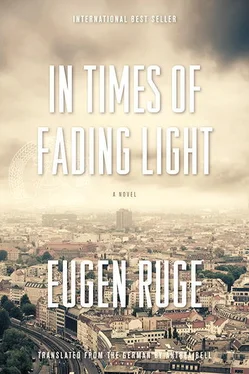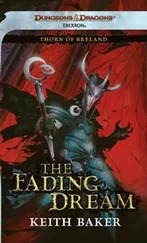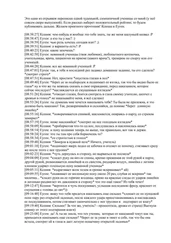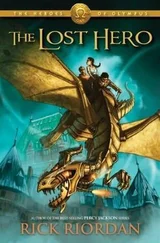Looking over heads and shoulders, he cast a glance at the inside of the building. Right at the far end was a big black cross. On each side of it were potted palms, looking artificial even from a distance. A little farther forward there was a wooden speaker’s lectern covered with black fabric—not very neatly covered; one thumbtack was missing, and the material sagged on that side. Then he saw Grandpa Kurt in the front row on the right, a gray head with a bald spot in the middle of it, and there beside Grandpa Kurt, on his right, he was.
Music began to play, classical music, squawking slightly because the loudspeakers were too small. The crowd settled down. People bowed their heads. Then a woman went up to the unevenly covered lectern, not a pastor, he could tell that at once, and began speaking:
Irina, dear Irina, said the woman, as if speaking to Granny Irina, we say there’s still plenty of time before we part—an idea that always fools us… But where was Granny Irina?
Markus craned his neck. The people had put their flowers and wreaths down at the other end of the room, a huge pile of them around a knee-high black stool with something like a vase standing on it—but where was the casket? It seemed all the stranger to him that this woman kept speaking directly to Granny Irina, as if she were sitting in the middle of the room with the rest of them… Other people were always welcome to you, we all came knocking at your door… And silly as it was, just to make sure he looked to see whether he hadn’t maybe misunderstood somehow, whether Granny Irina wasn’t sitting there next to Grandpa Kurt in the front row, or next to him, his father, but of course she wasn’t. Instead, his father’s new girlfriend was sitting there. He swallowed with disappointment.
I used to call you Nausicaa, said the woman at the lectern… Who was Nausicaa? No idea… a woman come to us from the days of classical antiquity… He looked cautiously around: did the guy with the purple face know what she was talking about?… a survivor of war, exile, emigration, a woman who made it possible to live this impossible life… The head with the purple face attached to it nodded… you were like that, Irina. You did that… The head with the purple face nodded again—and Markus imagined himself taking out a shotgun and blasting that silly, nodding head off its body.
Then the woman was suddenly talking about cooking… And the hospitality of your wonderful cuisine was unstinting, said the woman. At first Markus couldn’t quite make this out, but she suddenly turned out to be talking about cooking, or at least setting a dining table: The table you set before us was a work of art, said the woman, and added, sounding a bit crazy again: Your table invited guests to sit down to talk.
A pause.
Did you know how precious that was?
Another pause.
Did we tell you?
Once, he remembered, a long time ago, Granny sometimes used to make pelmeni and he was allowed to help. To this day he knew how it went: how you prepared the dough and rolled it into a sausage shape. How you cut slices off the sausage, dusted them with flour (so that they wouldn’t stick) but not too much flour (so that you could go on working the dough), and rolled them out into thin circles about the size of a saucer. And then came the most difficult part… As the high voice of the woman who wasn’t a pastor flew past him through the open double doors and out into the open air, he was back for a few moments in Granny Irina’s kitchen, with the unmistakable smell of dough and onions and chopped meat in his nostrils, and his thumbs and forefingers remembered exactly how the fiddly procedure went: you put a teaspoon of chopped meat on each little circle, you folded the circle over to make a half-moon, you pressed it together all the way around, and finally you pulled the two corners of the half-moon together and connected them to each other, so that it made a kind of little hat, as Granny Irina said, with the Russian accent that she had never shaken off, however often she was told how to say things properly, and although Frickel had never been there to hear it, Markus had always felt slightly ashamed that his granny spoke with such a Russian accent.
Your chair will be left empty now, he heard the woman who wasn’t a pastor say. For a moment he had a lump in his throat, maybe because he was reminded of the shabby old kitchen chair that he had knelt on to make pelmeni. Then he heard someone beside him sob, and he was back in the present.
Looking at the plastic potted palms.
Looking at the lectern untidily covered with black fabric.
Feeling his feet hurt with the cold.
And we must bear it, said the woman who wasn’t a pastor.
She paused.
The hour has come.
The sobbing got louder. The man with the purple face was wiping a tear from his eye now. But the more sobbing went on around Markus, the less he felt.
We must say good-bye.
The squawking music started again. Suddenly a little man appeared—where from?—a little man who looked like a shrunken fish in an old-fashioned railroad uniform. It was topped off by a railroad worker’s cap fastened under his chin with a strap. The little man took the something-like-a-vase off its plinth and carried it ahead of him like a special cake, or a silver cup, very slowly, and behind the little man walked the other people, led by his father and Grandpa Kurt. The people outside the door automatically formed a kind of honor guard, and all of a sudden he, Markus, was standing at the front of the honor guard. He could have touched his father. He almost did touch him! But his father passed by without noticing him.
Markus stayed standing by the door, watching the procession getting longer and longer. It moved along the avenue, turned right, when the last people had gone around the bend it turned right again, and then, led by the little man in the railroad worker’s cap, crawled slowly back in the opposite direction, until the little man stopped. The turf had been freshly dug up here, a broad strip of it like a vegetable bed, divided into lots of smaller beds. There were flowers lying on the first little bed already, and where the flowers stopped there was a hole in the earth, just large enough for that something-like-a-vase to fit into it, and at the moment when the little man bent down to lower the something-like-a-vase into the hole, Markus realized two things.
First, he realized why the little man had fastened his railroad worker’s cap under his chin with a strap.
Second, he realized that that, that something-like-a-vase, was Granny Irina.
On the way back it began to rain. His old army surplus coat was heavy. It took forever for his feet to warm up.
She was still feeling stunned. With difficulty, she had seen people off; had shaken hands, smiling; had listened to Bunke’s tipsy nattering; had nodded to Anita, who kept on and on assuring her that in spite of everything, it had been a lovely birthday party… Had apologized to Zenk yet again.
Now she was standing in the salon, inspecting the chaos caused by Wilhelm. The extending table looked like a bird that had suffered a nasty accident. Its two side panels were sticking up in the air at an angle. The stuff on the floor resembled the guts of a defunct animal.
She felt like phoning Dr. Süss right away: tangible evidence—wasn’t that what he’d said?
“Comrade Powileit, you’d need tangible evidence for that!”
Well, there was his “tangible evidence” for him.
She took a step forward, felt the point of the nail sticking in the tabletop… knocked on the wood as an experiment. To find out whether it made the same gruesome sound as the tabletop when it hit Zenk’s head, as he supported himself with one hand on the cold buffet to fish for a pickle on the other side… Zenk, of all people! She could still see him standing there, his broken glasses in his hands. Trembling. His big eyes swimming helplessly in his face…
Читать дальше












